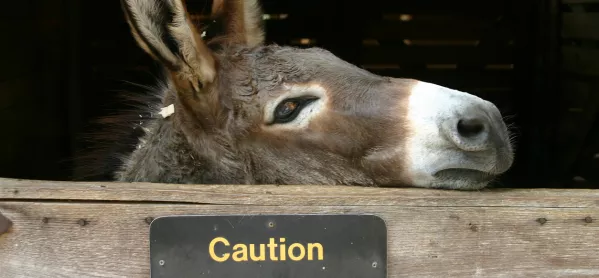We donkeys are furious at being compared to the DfE

My family and I have been proud, loyal domesticated donkeys for thousands of years, and would like to make the loudest possible “hee-haw” at our being likened to the here-today, gone-tomorrow bipeds currently ruling the roost at Education Farm.
Our main role on that farm may be limited to slow and simple fetching and carrying, but at least we know where we are going, and we always deliver.
For generations of slightly bewildered key stage 1 children, for instance, we have successfully conveyed them steadily up and down many a seaside beach, in all weathers.
By taking them on that ponderous and slightly strange little adventure across the sand, we have taught countless curious young learners the importance of indulging parents and showing resilience in all conditions. The experience also encourages the young to start asking that all-important educational question, “Why?”
Coronavirus: The many catastrophes of Farmer Williamson
For the gifted and talented, we also offer our services to that well-known educational game where blindfolded learners attempt repeatedly to pin our tails back on to our rears. What creature in that cosy farmhouse has ever exposed their rear for the benefit of educational development?
And all of that’s before we even mention our key role in primary schools at Christmas (usually), lugging all those Virgin Marys all the way to Bethlehem in nativity productions across the country.
So, although we may be regarded by some as mere scrubland figures on the peripheries of Education Farm, we actually compare quite favourably with the contribution made by Farmer Williamson and his lackeys down at the big farmhouse. Certainly this year.
No actual donkey was involved in the many farming catastrophes of the past few months. It wasn’t us, for example, who caused the bloody mayhem in the farmyard back in August. That was all down to Farmer Williamson and his people agreeing to unleash the brutal algorithm beast, and then sitting back and watching it run amok in the yard.
“Don’t worry! It’s robust,” they shrieked in its defence. It looked like carnage for thousands of helpless little chickens there, until someone finally had the sense to shoot the beast. Needless to say, Farmer Williamson blamed the supplier.
This is not the time or place to run through all the other wrong decisions, indecisions and hopelessly late decisions made this year. But just remember that none of those was made by a donkey, either.
Understanding what really happens in the field
Our trademark ears are now currently flapping, following murmurs in the yard of revolution. This has caused some concern in the donkey community. Education Farm may slowly be turning into Animal Farm, and things don’t end well for noble, hard-working equines there.
But workers out in the field are understandably feeling knackered and neglected - hardly placated by yet another late call from the farmhouse, this time to close the place early for Christmas and to make up the time next year.
If we do go the full Animal Farm, who will be Napoleon, the revolutionary ringleader? Presumably, it will be the one the workers all call Mary - as in Bousted, not Virgin - the smart, articulate figurehead for many toilers in the field.
But if she will be Napoleon, who will be Snowball, the rival revolutionary? Maybe that’ll be the handsome, mercilessly reasonable Geoff Barton, the darling of the farm foremen and forewomen.
If so, the story will not end happily for Geoff. Mary will see him as a threat and set the dogs on him. Geoff will never be seen again.
Though, to be serious, Orwell did call it a “fairy tale”, and our own story doesn’t necessarily have to end so miserably.
Over the coming holiday maybe - just maybe - those (genuinely) bright and well-intentioned people at the farmhouse will have time to reflect on what the past year has revealed to them.
It’s not too late for them to acknowledge their alarming lack of comprehension of what actually happens out in the field. They could think about how to redesign the farmhouse and their work so that it is geared to listening to all teachers (not just union leaders) - and perhaps even employ a few more recent ex-teachers there.
If they do that, then they, too, might go down in history as “lions”.
Stephen Petty is head of humanities at Lord Williams’s School in Thame, Oxfordshire
You need a Tes subscription to read this article
Subscribe now to read this article and get other subscriber-only content:
- Unlimited access to all Tes magazine content
- Exclusive subscriber-only stories
- Award-winning email newsletters
Already a subscriber? Log in
You need a subscription to read this article
Subscribe now to read this article and get other subscriber-only content, including:
- Unlimited access to all Tes magazine content
- Exclusive subscriber-only stories
- Award-winning email newsletters